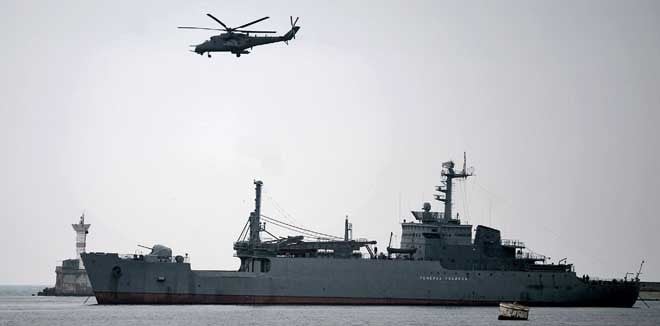

A more resurgent Russia under Putin is flexing its muscles in Centre of Europe, Eurasia and the Black sea. The Ukraine crisis seems pregnant with a second episode of cold war. The current Russian foray in Ukraine has posed a formidable challenge to the Obama administration. The challenge is profound in redefining relations between Moscow and Washington.
Elected as President to recede the tide of war, Obama has set out to rectify the excesses committed under the Bush administration. The president wants to enhance the power of United States through smarter diplomacy. The hawks in Washington have termed it a "dangerous retreat from the world affairs at a time when American influence is badly needed."
The Arab Spring has slipped into a military coup and a civil war; Syria is bleeding while procrastination at Security Council has hampered the United States from action. A more assertive China is threatening the allies of the US in South China Sea while allies in the Middle East are hurt with President Obama’s ‘inconsistencies’. American public has grown weary of wars and interventions and want to reduce the Pentagon’s budget to pre-2001 level. All these issues have indicated a vacuum to the world leaders, particularly Russia and China, to pursue a more aggressive and assertive foreign policy.
On the other hand, Putin, determined to revive the lost stature of Moscow in the world affairs, has resorted to aggressive policies towards his neighbours. In 2008, Russia routed the Georgian troops leading to break-away of two disputed territories, Abkhazia and South Ossetia; brushed aside warnings from United States and Europe; and recognized the two territories as independent countries. Now is the turn of Ukraine to suffer humiliation, the way Georgia was humiliated six years back for looking westward.
Moscow is witnessing fatigue with the West and the United States. In the case of Ukraine, the US and EU have failed to understand the historical, social and religious connections between Ukraine and Russia. The overthrow of the Mr. Yanukovych is considered as a coup orchestrated by the West to undercut Russia’s vital interests. Kremlin has accused the West of supporting the opposition against the elected government and imposing on Ukraine the option to choose either EU or Russia.
The role of EU and USA in Eastern Europe is perceived as detrimental to Russian interests. This has convinced Moscow of the older maxim that "Russia has only two friends; its navy and army".
The current Russian advance in Ukraine under the pretext "to protect citizens and compatriots" is the biggest challenge to the Obama administration for several reasons. In the short run, Russia is too difficult to be pressurised; too resurgent to be educated through stern lectures or threats of military force; and economically strong enough to be squeezed. On the other side, Russia, having a veto at the United Nations Security Council (UNSC) has rendered the world body helpless. Moreover, Russia is the largest supplier of natural gas to much of Europe, thus she holds a trump card over Europe as well.
In the long-run, Washington may impose more sanctions on the Russian financial institutions to choke its economy. But the option is too painful as Europe might not accompany the United States in doing so. Moreover, President Obama relies on Russia for dealing with Iran and Syria. The way Obama deals with Russia will send a new message to allies and enemies alike.
Till now, Putin has showed no sign of succumbing to international pressures. A Putin’s spokesman brushed aside the American threat of boycotting the Group of 8 Summit and termed it "a minus not for Russia but for the G-8".
John Kerry declared the Russian adventure as an "incredible act of aggression". While alluding to the Russian march in Ukraine, he said "You just don’t invade another country on phony pretexts in order to assert your interests." He outlined an array of options for dealing with Russia which includes freezing of assets, or travel bans of highest officials. While some sanctions have already been imposed, more sanctions against Russia are at the table of the Obama administration.
However, the Ukraine crisis has projected Russia once again in competition against the United States and Europe in the Central and Eastern Europe. The crisis has the potential to profoundly alter US-Russia relations. The unresolved legacy of the cold war has resurfaced to test the Obama’s diplomacy. The failure or success will determine the standing of the US in the world. No doubt, the Ukraine crisis has proved to be the gravest challenge to the Obama’s administration so far.